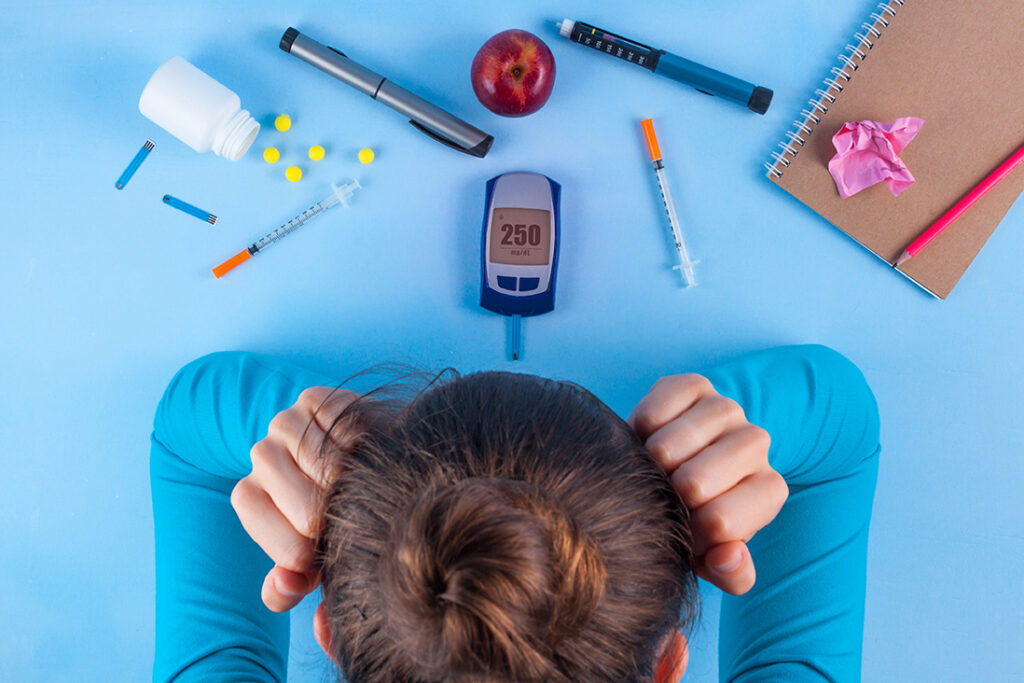Can diabetes cause anxiety? This is a common concern for many individuals managing this chronic condition. Beyond monitoring blood sugar levels and maintaining physical health, diabetes often brings emotional and mental health challenges. Research shows a strong connection between diabetes and anxiety, with the stress of managing the condition contributing to emotional strain. Frequent worries about blood sugar fluctuations, potential complications, and the daily demands of diabetes management can heighten anxiety levels.
In some cases, the physical symptoms of blood sugar imbalances, such as shakiness or dizziness, can mimic or trigger anxiety episodes. Additionally, living with diabetes can lead to feelings of overwhelm, which may increase the risk of depression and anxiety disorders.
This article delves into the intricate link between diabetes and anxiety, shedding light on the causes, symptoms, and practical strategies to manage both conditions effectively, improving overall well-being.
Connection Between Diabetes and Anxiety
Living with diabetes requires constant attention to blood sugar levels, dietary management, and lifestyle adjustments, all of which can lead to emotional strain and anxiety. But how does this connection occur?
Does Diabetes Cause Anxiety?
Yes, diabetes can cause anxiety as diabetes and mental health are interconnected. Managing a chronic condition, fearing complications, and dealing with the unpredictability of fluctuating blood sugar levels often contribute to feelings of worry and unease. This is especially common in individuals with poorly controlled diabetes or those recently diagnosed, who may feel overwhelmed by the demands of managing their condition.
Can Diabetes Cause Anxiety Symptoms?
People with diabetes frequently report anxiety symptoms, including restlessness, nervousness, and difficulty concentrating. Blood sugar imbalances can exacerbate these feelings. Episodes of high blood sugar (hyperglycemia) or low blood sugar (hypoglycemia) often mimic or trigger anxiety, creating a vicious cycle of physical and emotional discomfort.
Can Diabetes Cause Anxiety and Depression?
Yes, the relationship between diabetes, anxiety, and depression is well-documented. The psychological burden of managing diabetes, coupled with the fear of complications, can lead to co-occurring mental health issues. Addressing both physical and emotional well-being is essential for overall health.
Understanding the link between diabetes and anxiety highlights the importance of holistic care that considers both mental and physical health in diabetes management.
How Does Blood Sugar Impact Anxiety?
Can high blood sugar cause anxiety?
High blood sugar, or hyperglycemia, can directly influence mood and cause irritability or anxiety. For some, prolonged periods of high blood sugar may even trigger anxiety and panic attacks, as the body struggles to maintain balance.
Can low blood sugar cause panic attacks?
Low blood sugar (hypoglycemia) can mimic the symptoms of anxiety or panic attacks, such as rapid heartbeat, sweating, and shakiness. This is especially common during low blood sugar anxiety in the morning when fasting glucose levels drop.
Anxiety and blood sugar levels
Anxiety can also lead to physical changes that impact blood sugar. The release of stress hormones like cortisol during anxiety episodes can cause blood sugar to spike. This explains why people wonder, “Can anxiety cause blood sugar to rise?” For those without diabetes, anxiety may raise blood sugar levels temporarily. However, in people with diabetes, these fluctuations can be more severe.

Diabetes-Related Triggers for Anxiety
Can untreated diabetes cause anxiety?
When diabetes is left unmanaged, it can cause severe fluctuations in blood sugar levels, leading to physical symptoms like fatigue and confusion, which can increase feelings of anxiety.
Can pre-diabetes cause anxiety?
Even in the early stages of diabetes, fluctuating glucose levels may contribute to feelings of nervousness or unease. For many, anxiety may be the first sign that something is wrong, prompting them to seek medical advice.
Can gestational diabetes cause anxiety?
Pregnancy can already be a stressful time, and developing gestational diabetes adds additional pressure. The constant monitoring of blood sugar levels and fear of complications for the baby can significantly contribute to anxiety symptoms.
Is anxiety a symptom of diabetes?
Yes, anxiety can sometimes be a symptom of undiagnosed or poorly managed diabetes. Individuals may experience persistent nervousness or worry, which could indicate a need for a diabetes evaluation.
Symptoms of Diabetes-Related Anxiety
Identifying the wide range of symptoms associated with diabetes-related anxiety is essential for timely support and intervention. These symptoms often affect both emotional and physical well-being, including:
Persistent worry:
Constant fear about blood sugar levels, complications, or long-term outcomes.
Physical symptoms:
Rapid heartbeat, chest tightness, sweating, nausea and vomiting, shakiness, dizziness due to diabetes, gastrointestinal discomfort, and diabetic fatigue may overlap with blood sugar fluctuations.
Sleep disturbances:
Insomnia or restless sleep is caused by worrying about nighttime hypoglycemia or other diabetes-related issues.
Difficulty concentrating:
Trouble focusing due to preoccupation with managing diabetes tasks or fear of potential complications.
Fatigue:
Emotional exhaustion stems from the ongoing demands of diabetes management.
Irritability or mood swings:
Heightened emotional sensitivity or frustration, exacerbated by fluctuating blood sugar levels.
Avoidance behaviors:
Skipping meals, blood sugar checks, or medical appointments out of fear or stress.
Hypervigilance:
Excessive checking of blood sugar levels or overanalyzing symptoms, leading to increased anxiety.
For individuals with type 1 diabetes, anxiety might revolve around frequent injections, hypoglycemia risks, or insulin pump concerns. Those with type 2 diabetes often experience anxiety due to lifestyle changes, medication adherence, or fear of complications like heart disease.
Recognizing these symptoms and addressing them promptly can significantly improve overall well-being and the ability to manage diabetes effectively.

Can Anxiety Lead to Diabetes?
Can stress and anxiety cause diabetes?
While anxiety itself does not directly cause diabetes, chronic stress and anxiety can lead to behaviors that increase the risk of type 2 diabetes, such as overeating, poor diet, or lack of physical activity. Prolonged stress may also influence insulin resistance, a precursor to diabetes.
Can anxiety mimic diabetes?
Yes, the physical symptoms of anxiety—such as sweating, fatigue, and lightheadedness—can resemble diabetes symptoms, leading to confusion.
Managing Anxiety and Diabetes
Addressing both conditions simultaneously is key to maintaining overall health.
Blood Sugar Management
Maintaining stable blood sugar levels can reduce symptoms of anxiety. Tips include:
- Regular blood sugar monitoring to prevent fluctuations.
- A balanced diet with whole grains, lean proteins, and healthy fats.
- Avoiding excessive sugar to reduce the risk of blood sugar spikes that may mimic or trigger anxiety.
Mental Health Support
- Therapy: Cognitive-behavioral therapy (CBT) is highly effective in managing anxiety and diabetes symptoms.
- Medication: If necessary, consult a healthcare provider about the best anxiety medication for diabetes to ensure it won’t interfere with blood sugar control.
Stress-Relief Techniques
- Practicing mindfulness and relaxation exercises to calm the mind.
- Engaging in physical activity, benefits both mental health and blood sugar levels.
When to Seek Professional Help?
If poorly managed diabetes leads to persistent anxiety, it’s essential to consult a healthcare provider. Signs for which you need professional help include:
- Frequent episodes of panic attacks.
- Difficulty performing daily diabetes management tasks due to anxiety.
- Symptoms of depression alongside anxiety.
Conclusion
So, can diabetes cause anxiety? The answer is a resounding yes. Living with diabetes presents unique challenges that can lead to anxiety, whether through physical symptoms, emotional stress, or a combination of both.
By understanding the link between diabetes and anxiety and taking proactive steps to manage them, individuals can improve both their mental and physical health.
FAQs
Can high blood sugar cause anxiety attacks?
Yes, high blood sugar can lead to symptoms like irritability and restlessness, which may escalate into anxiety or panic attacks.
Can low blood sugar cause panic attacks?
Yes, low blood sugar can mimic panic attacks with symptoms like sweating, rapid heartbeat, and confusion.
How can I tell the difference between anxiety and low blood sugar?
Check your blood sugar during symptoms. Anxiety is more likely if levels are stable, while hypoglycemia typically accompanies low glucose levels.
Can diabetes cause panic attacks?
Yes, the stress of managing diabetes or sudden blood sugar fluctuations can lead to panic attacks in some individuals.
Is anxiety a symptom of diabetes?
Anxiety can sometimes signal undiagnosed diabetes or poor blood sugar control.
Can stress and anxiety cause diabetes?
Chronic stress may contribute to behaviors that increase the risk of type 2 diabetes, such as overeating or inactivity.
Can type 1 diabetes cause anxiety?
Yes, managing type 1 diabetes, especially frequent insulin administration, can trigger anxiety.
Can type 2 diabetes cause anxiety?
Yes, lifestyle changes and fear of complications often lead to anxiety in people with type 2 diabetes.
Can anxiety raise blood sugar in non-diabetics?
Yes, anxiety can temporarily raise blood sugar levels in non-diabetics due to stress hormone release.
What is the best anxiety medication for diabetes?
Consult a healthcare provider to find medications that are safe and compatible with diabetes management.
Can uncontrolled diabetes cause anxiety?
Yes, uncontrolled diabetes can cause anxiety due to blood sugar fluctuations, fear of complications, and the stress of management challenges.




